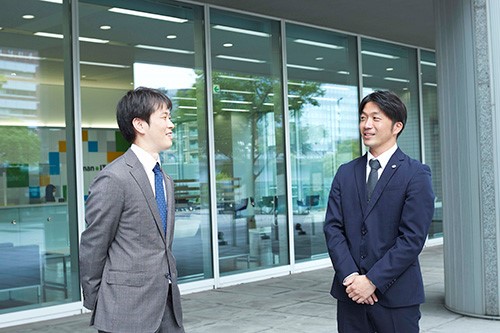
Yusuke Suzuki has made great strides in contributing to the adoption of DX (Digital Transformation) in Tokyo. Here, we would like to introduce the story of how he started in Tokyo and worked hard to further accelerate the adoption of DX by local governments across the entire country.
Yusuke Suzuki
Manager
Sales Management Group

After joining the company in 2007, Suzuki has been in charge of sales of information systems for local governments, mainly in the Kanto region. In 2014, he was temporarily dispatched to Hitachi, Ltd., where he was responsible for sales of information systems and information infrastructure geared toward international sporting events. In 2016, he made a significant contribution to the design and construction of the Tokyo Metropolitan Government's "Municipal Information Security Cloud" project. This project involved around 200 engineers from around 20 collaborating organizations. After returning to Hitachi Systems in 2017, he focused his efforts on being the Tokyo Metropolitan Government account sales representative* and worked as a sales professional promoting DX throughout the Tokyo metropolis.
(* Account sales representative: A sales position where the person is placed in charge of a specified client and is responsible for solving any issues they are facing.)
To achieve this goal, Suzuki is striving to promote the adoption of DX (Digital Transformation) in Tokyo.
As the Tokyo Metropolitan Government account sales representative, Suzuki not only conducts his own sales and proposal activities but also performs general management duties as the leader of a team consisting of over 20 account sales personnel in Tokyo. Here, we would like to introduce his illustrious career and how he managed to gain the trust of his colleagues, clients, and collaborating organizations.
Since his school days, Suzuki was fascinated by the immense future possibilities of the IT industry. After graduating high school and entering university, he also took extracurricular classes in information technology and worked part-time in web development to acquire practical IT skills so that he would have an advantage in finding work in the IT industry. While job hunting, he approached many IT companies but decided to join Hitachi Systems as he was impressed by the sheer scale of the company and its business as well as the potential opportunities to make connections throughout the industry.
Upon joining the company, Suzuki was placed in charge of sales of information systems for local governments in the Kanto region, including Tokyo and Kanagawa. During field sales work on islands such as Mikurajima and Hachijojima off the coast of Tokyo, he was often away from home for almost a month to perform tasks such as server deployment and data migration. Thanks to Suzuki's sales and proposal prowess which was backed by a wealth of IT expertise, He managed to gain the trust of clients and soon began to be consulted for various cases.
Despite being extremely busy, his relentless dedication to his work throughout his twenties enabled him to learn two styles of sales work. The first sales style aims to "gain deep insights into the client's needs and preferences." He began to carefully listen to his clients' problems and objectives and made an effort to provide the most appropriate information, which made them more receptive. Over time, he received more and more information from various clients which gave him an intricate knowledge of the challenges and circumstances of organizations that sometimes even exceeded the knowledge of the client. His deep understanding of the clients was also extremely useful when making proposals for new systems.
The second sales style was the "proactive adoption of new technologies into proposals." As Suzuki was well versed in new technology trends, when he found a product or solution that utilized new technology, he often approached the company that developed it to build a business partnership to give access to Hitachi Systems. His proactive attitude toward new technology gradually gained recognition within the company, and he soon got the reputation of being the first choice for projects that utilized new technology.

Around the age of 30, when he had established his own sales styles and his career was becoming much more interesting, he reached a major turning point when he was temporarily dispatched to Hitachi, Ltd. Due to his experience and solid track record in local government sales and extreme savviness for new technology, he was tasked with working in sales for international sporting events. Despite becoming even busier, he was highly motivated to take on a completely new role that no one in Japan had ever performed.
In the third year of his temporary assignment to Hitachi, Ltd., Suzuki reached yet another career turning point that would lead to his current role in account sales for the Tokyo Metropolitan Government. He was assigned to the design and construction project for the Tokyo Metropolitan Government's Municipal Information Security Cloud. The Municipal Information Security Cloud is a system in which a system in which a prefecture and the comprising municipalities aggregate their web servers and implement advanced security measures, such as monitoring and the analysis of logs. Although the Japanese national government requested that local governments deploy this system in 2015, Suzuki's sales team had already been urging the Tokyo Metropolitan Government to deploy a similar system. In regard to how he was able to get ahead of the national trend, Suzuki stated the following:
"At one time, I had the opportunity to speak with someone involved in a major international sporting event in Brazil. This event attracted a range of cyberattacks that targeted not only the national government but also local governments. That's when I realized that Tokyo, the city where the next major event was to be held, was highly likely to also be targeted. I knew that we needed a system to protect Tokyo from these threats."
Thanks to being able to prepare a security plan for Tokyo in advance of the national government's request, Suzuki and his sales team were able to create a solid proposal that included a proactive detection mechanism. "Proactive detection" is a technique that predicts potential cyberattacks by using AI technology to analyze huge volumes of communication logs from 62 municipalities in the Tokyo metropolitan area and greater Tokyo. This approach was not included in the basic requirements of the Municipal Information Security Cloud stipulated by the government.
Their proposal to include proactive detection received high praise and Hitachi, Ltd. was awarded the contract for the design and construction project for the Tokyo Metropolitan Government's Municipal Information Security Cloud. This ended up being a major project involving around 200 engineers and around 20 external partner companies, and Suzuki led the project to a splendid success while negotiating with clients and effectively managing the project members.

After receiving a great deal of praise for his achievements, Suzuki continued to work as the Tokyo Metropolitan Government account sales representative after his return to Hitachi Systems in 2017. He was soon put in charge of sales for various sectors such as tourism, industry, startup support, water and sewage services, and disaster prevention, where he facilitated the adoption of many DX initiatives. Among these initiatives, the introduction of the AI-based Meeting Minutes Creation Support System greatly contributed to improving the efficiency of staff. Since the start of the COVID-19 pandemic in 2020, the number of meetings related to virus countermeasures has increased rapidly within the Tokyo Metropolitan Government, and the enormous amount of work involved in creating meeting minutes has been viewed as a problem. After being implemented, the Meeting Minutes Creation Support System automatically transcribed the meeting contents using the AI-based voice recognition engine, making it possible for a single employee to create the minutes in around 20 minutes. As the rapid publication of the minutes of meetings related to COVID-19 countermeasures was of extremely high interest to Tokyo residents, this system had an immense benefit for society.
Suzuki confidently says, "I enjoy my work the most now since joining the company. He hopes that the achievements gained through digitization projects in the Tokyo Metropolitan Government will spread to other local governments, and provide momentum to a whole range of new local government DX adoption efforts. Regarding his future prospects, Suzuki said the following:
"I believe that the key to the further digitization of local governments is that they must be prototype-driven. The first step is to create a successful example of DX implementation that can be used as a prototype in a specific theme or field. We must then encourage the revision of associated rules, laws, and regulations. This is my personal approach to supporting the revitalization of Japanese society."
Although Suzuki's career seems to have been smooth sailing up to that point, at the age of 34, he considered taking a leave of absence due to unavoidable family circumstances. However, he was able to continue working in his role thanks to the kind understanding and support of his co-workers and superiors, and by utilizing the telecommuting system and other systems of support provided by the company. He currently continues to work from home two days a week and is still able to fulfill the multitude of responsibilities that come with his role as the Tokyo Metropolitan Government account sales manager.
In his private life, Suzuki says his biggest interest is raising his two children. Perhaps seeing their father working at home has influenced them. "Recently, my child tells me, 'I want to work at your company when I grow up, dad!'" Suzuki is adamant that his quest to speed up the adoption of local government DX initiatives in Tokyo and throughout Japan will surely continue into the future.

As an account sales representative in Tokyo, Suzuki has worked on numerous projects to promote the adoption of DX by the Tokyo Metropolitan Government. Looking toward the future, he hopes to continue to actively provide information and formulate utilization proposals of cutting-edge technologies in order to satisfy the Tokyo Metropolitan Government's requirement to continuously provide drastic improvements to the QOS (Quality of Service) of the metropolitan government through DX technologies.
The Tokyo Metropolitan Government's digitization efforts are attracting significant attention from local governments across the country. Suzuki has worked with the Tokyo Metropolitan Government to create many successful projects that can be used as model cases to help DX initiatives spread to other local governments.
As the Tokyo Metropolitan Government account sales manager, Suzuki is responsible for supporting sales activities and maintaining a balance throughout the entire account sales team. However, in the future, he also wants to focus on training junior sales representatives. By actively passing down his know-how and skills to the next generation of sales representatives, he hopes to nurture as many new local government DX specialists as possible to ensure maximum contribution to the promotion of digitization throughout the Japanese government.
Information contained in the articles are as of the date of publication, but may be subject to change without prior notice.
If you have any questions or comments, please contact us from the link below.
Personal information provided will solely be used for the purpose of internal communication activities. We will not use your personal information without your prior approval, except cooperative use with a Hitachi Group company, which we outsource internal communication activities. When you click the link below, you are deemed to agree that we handle with your personal information in accordance with above-mentioned conditions.
Corporate Communications Department
Hitachi Systems, Ltd.